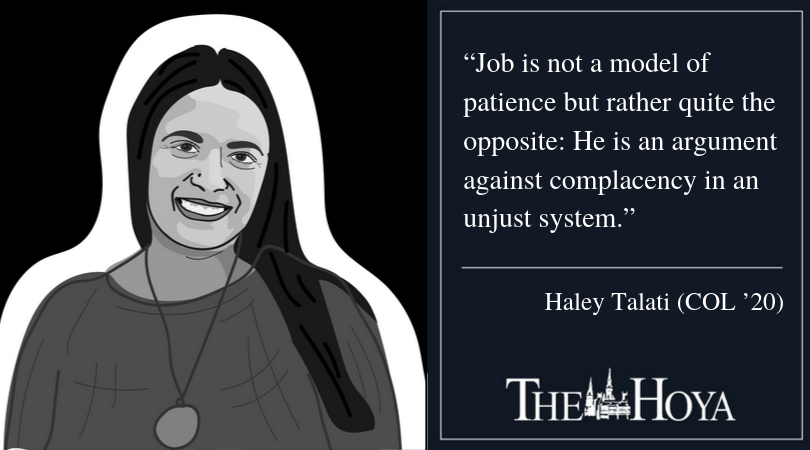Many American conservatives like to argue that gun ownership is a God-given right. While there isn’t a strong biblical basis for such arguments, the Book of Job does offer some relevant — if indirect — suggestions about how progressives should engage in the gun violence debate. Job’s righteous anger and his determination to hold the biblical God accountable for wrongs committed against him serves as a model for how we should deal with injustice in our own times.
The story’s plot is simple: After God boasts about Job’s uprightness, a member of the divine court challenges that Job would not be so virtuous were he not so materially fortunate. In response, God allows for the destruction of Job’s property, the deaths of his children and the infliction of “loathsome sores” (Job 2:7) all over his body. For seven days, Job suffers in silence before going on to eloquently reflect upon his circumstances and ask God why he has been subjected to such tragedy.
Readers of this story traditionally laud the so-called “patience of Job,” presumably in recognition of his refusal to “curse God and die” (Job 2:9) — something even his wife recommends. But such readings fundamentally misunderstand the text and the character of Job himself, who is anything but patient: After his week of silence, he lets out his rage and grief in full force. For 35 chapters, Job speaks with friends who insist he must have sinned badly to deserve such a punishment. But Job does not submit to God’s treatment; he demands an explanation from God and clings to his own innocence.
Eventually, God does respond. In what seems to be at least a partial validation of Job’s anger, God grants him twice as much material wealth as he’d had before, replaces his children and scolds his friends for not speaking the truth as Job had done — Job holds God accountable and eventually receives a just outcome.
Unlike certain other biblical stories, the political implications of the Book of Job are not explicit, but Job’s story is relevant to the current debate about guns in the United States. Many Americans are all too familiar with the feeling of sudden, inexplicable loss that Job experiences — and just as Job’s demands for an explanation are initially met with silence, the families of gun violence victims often only receive “thoughts and prayers” from conservative politicians, who persistently refuse to enact common-sense gun violence prevention legislation.
Though they may not invoke his name directly, these conservatives demand just the sort of patience falsely attributed to Job — much like Job is seen as passively deferring to God’s supreme will, conservatives insist that active legislative solutions will not stop gun violence and quietly accept the supposedly unpreventable deaths of thousands of their constituents. But in just one recent example of the clear inaccuracy of their claims, the gunman who killed seven people in and nearby Odessa, Texas, last month bought his firearm from a private sale after previously failing a background check — had Congress enacted legislation requiring background checks on all sales, these senseless deaths might have been avoided.
Job serves as a good model of how progressives should respond to injustice and hold people accountable for their actions, but conservative legislators have something to learn from his story as well. Specifically, the Book of Job calls attention to the possibility and importance of changing destructive behaviors — making amends to Job by restoring him to his previous fortunate state partially redeems God’s character. Conservatives should model this behavior as closely as they can by ending their complicity in needless deaths and taking action on gun violence. Unlike the biblical God, they cannot simply replace the people whose deaths their negligence has caused, but taking substantive legislative action now would help save some of the more than 30,000 people killed by guns in the United States every year. The wrongs of the Republican Party on this issue can never be truly made right, but it’s not too late to prevent future injustices by responding to progressives’ rightful indignation.
Job is not a model of patience but rather quite the opposite: He is an argument against complacency in an unjust system. Faced with a government willing to sacrifice the lives of tens of thousands of people each year instead of enacting gun violence prevention measures, rejecting patience is more important now than ever.
Haley Talati is a senior in the College. Between the Lines appears online every other Thursday.















Rj21 • Oct 11, 2019 at 9:50 am
Nehemiah 4:17-18 : “[People of Judah] were building on the wall. Those who carried burdens were loaded in such a way that each labored on the work with one hand and held his weapon with the other.”
To stop illegal infiltration of guns from Mexico is why we need a wall, with ordinary people having a weapon for their own protection because if someone is shooting at me, I would like to have the chance at them + defending my person in the process.
Alex Mazzeo • Oct 9, 2019 at 7:01 pm
Luke 22:36 : “He said to them, “But now if you have a purse, take it, and also a bag; and if you don’t have to e a sword, sell your cloak and buy one.”
I think you should look into this